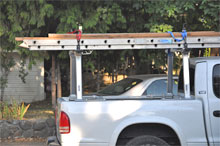Contractors are people, too. What does that mean? Well, even though they may have licenses and many years of experience in their profession, they are fallible. There are good ones and bad ones. Some are ethical and honest, while others seem to be missing a conscience. Just as you would be careful about choosing a nanny, a personal accountant, or a used car salesman, so should you use caution in selecting a contractor before you begin that home building project, renovation, or repair. Here are some good tips to avoid getting taken for a ride:
 Do your research. The Internet is a great place to find consumer reviews of anything and everything, including contractors. Pay attention to what others have said about their experiences with contractors in your area. Usually, if someone takes the time to post a review online, it's for either a very good or a very bad reason.
Do your research. The Internet is a great place to find consumer reviews of anything and everything, including contractors. Pay attention to what others have said about their experiences with contractors in your area. Usually, if someone takes the time to post a review online, it's for either a very good or a very bad reason.- Before meeting with a contractor, check with the Better Business Bureau to see what his or her track record is like, and if any complaints have been filed.
- Ask for references. Bear in mind that most contractors already have what they know will be three stellar references in their back pocket. Ask for four or five.
- Keep in mind that flashy advertising does not a good contractor make. On the contrary, many of the best contractors thrive due to great word of mouth, and don't even need or bother to advertise. Don't be fooled by slick marketing.
- Stay away from contractors who don't have a local address, is not affiliated with any recognizable trade association, and/or has unverifiable license or insurance information. Make sure your contractor has insurance to cover his or her employees in the event that any of them are injured while on the job at your house.
- Draw up a contract with clear start and finish dates. Have an attorney look over the contract to make sure it's solid.
- Once work begins, you should know exactly how many and what types of supplies, appliances, and fixtures will be purchased for the job.
- Pay as you go. It's not uncommon for consumers to pay contractors in stages as the job progresses. And it's smart to withhold part of the final scheduled payment if there are any loose ends that remain to be tied, or little repairs that need to be made.
If you are hiring a contractor in North Carolina to help rebuild after any sort of natural disaster or accident, and your insurance company is footing some or all of the bill, don't hesitate to involve your insurance company or agent if you have any questions or concerns. He or she will be a good, trustworthy resource as you navigate the ins and outs of employing a contractor.
